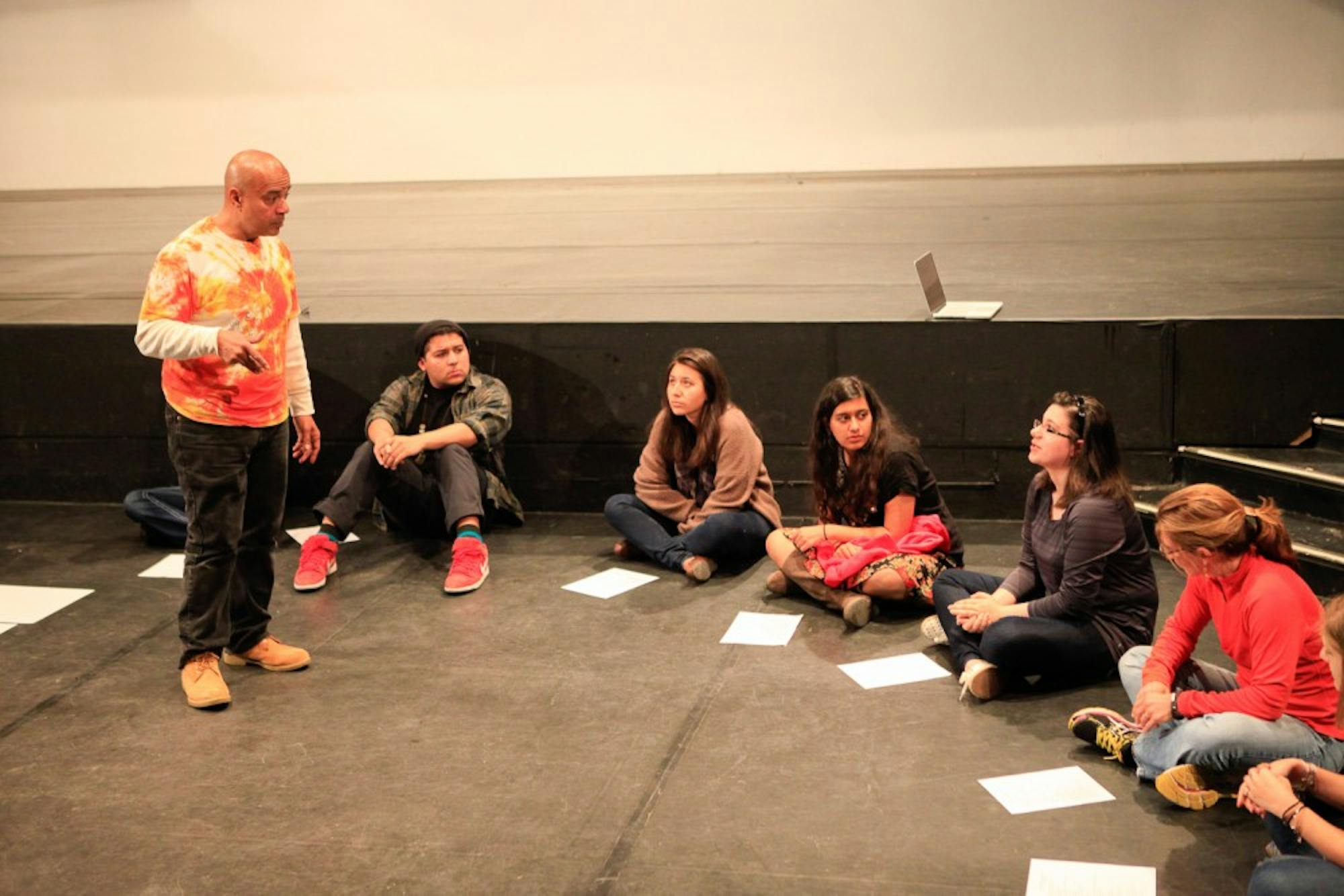“This is the year that those / who swim the border’s undertow / and shiver in boxcars / are greeted with trumpets and drums.”
So begins a stanza from Martin Espada’s poem “Imagine the Angels of Bread,” which imagines a future where persons who have been historically discriminated against and disadvantaged are rewarded. On Saturday afternoon, 30 students, parents and teachers participated in a Bentley Theater workshop that used Espada’s poem to launch conversations about campus climate.
Led by Patricia Herrera ’96, Jose Joaquin Garcia and Jesse Myerson, the workshop, “This is the Year: Theater for Social Justice in the Hands of Students,” lasted an hour and a half and included a concluding performance motivated by participants’ discussions. Based in New York City, Herrera, Garcia and Myerson have created workshops and plays together for six years that use theater to discuss issues such as race and racism.
Garcia kicked off Saturday’s workshop with stretches and verbal warm-up exercises. Myerson then performed a reading of Espada’s poem and asked participants to pinpoint the lines that most resonated with them.
Garcia then asked participants to reflect on which social justice issues they considered most important to campus, prompting responses that included sexual assault, roles and opportunities for minority students and the Greek system. The group chose to focus on sexual assault for the remainder of the performance, discussing misconceptions about consent and media portrayals of assault.
For the remainder of the workshop, participants worked toward a final performance in the Courtyard Cafe. They hummed and sang “We Shall Overcome,” beat-boxed, stated myths about sexual assault and chose a culminating message: “You shouldn’t care because it happened to a friend, but because it happens.”
They also chose a final question to pose to the audience — “How many of you know of a person who has been sexually assaulted?”
The performance after the workshop drew an audience of two dozen people. Almost all the performers and audience members raised their hands to the final question, a visual reminder that sexual assault is a pressing campus concern.
Participants debriefed in the black box theater after the performance. Many commented that it was the first time that they had participated in this type of theater exercise.
As a send-off message, Garcia asked everyone to gather in a circle and hold hands. He encouraged students to not be afraid to talk about race, regardless of their skin color.
The trio has many inspirations for its projects, but race and racism are the most common themes, Herrera said. The group recently created a musical titled “Reminiscence,” which is currently being rehearsed at the University of Richmond.
“The trauma of slavery still remains — the violence that we have and lack of education and confidence of success has to do with that trauma of white owners saying that these [people] are objects,” Herrera said. “It’s been ingrained for so long in our society — it has to have some sort of effect. It’s still lingering.”
Myerson said the effects of slavery continue to pervade modern American society in violent ways, including mass incarceration, racist policing and degraded social and economic status of people of color.
“Media portrayals tell the same myths about black people,” he said. “Irresponsibility, shiftlessness, bad family — when these myths arose, white folks were saying that the people who were doing all of the work were lazy and saying that the peoples who they were ripping apart of their family were bad.”
Garcia, who chose Espada’s poem to launch discussions at the workshop, said he liked that the poem manages to be both inspiring and thought-provoking.
“It imagines a better world with language that is completely accessible,” he said. “It is a call to arms, a call to be proactive.”
Government professor Lisa Baldez, who organized the workshop, said that this was her first time performing guerrilla theater, a form of pop-up theater that often includes protest themes. She said she was nervous about performing at such an event, especially because she has two sons who are current Dartmouth students.
Graduate student Ibrahim Khan said he enjoyed the length of the workshop and performance component.
“In one hour, we created something we could actually perform,” he said. “It was effective and not too heavy-handed.”




